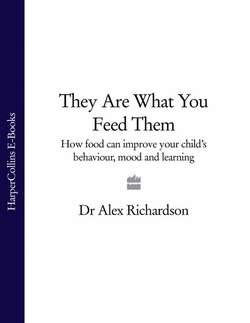Читать книгу They Are What You Feed Them: How Food Can Improve Your Child’s Behaviour, Mood and Learning - Dr Richardson Alex - Страница 29
It’s Up to You to Take Charge
ОглавлениеIt’s easy to blame the health services, your child’s school, the social workers or other professionals for ignoring any dietary issues that you think are affecting your child. In the current climate, though, strict financial controls, superficial ‘efficiency’ criteria and short-term goals have come to dominate. These will obviously colour both the motives and the information available to managers and policy-makers in these areas. I share your frustration—but these are not things that most of us can hope to influence very easily, so there’s little point in dwelling on them for long here.
It’s your life, and your child’s life, that we are focusing on in this book.
You may already have adopted some dietary strategies with your child. If so, I hope you’ve already seen some benefits. You’ll also need some luck, though, because much of what you’ll have read or been told about the effects of food and diet on your child’s behaviour and performance is not actually supported by any reliable evidence—usually because the studies needed to provide this just haven’t been done. This is a real problem that I’ll do my best to help you with in this book. Mind you, the same is also true of a remarkable number of ‘interventions’ (treatments or management methods) that are part of ‘standard practice’ in medicine—not to mention the education, social services and criminal justice systems.
Some research into how food and diet may be affecting our behaviour is almost impossible to do—either because the ‘uncontrolled experiments’ have been going on for so long that there is no control group left, or because ethical issues make some types of studies difficult or impossible. For example, in the Western world we have all been consuming ‘trans fats’ for many decades now. (You can read more about these in Chapter 8.) These artificially twisted fats are found in hydrogenated vegetable oils (used in many cheap margarines, fried foods and commercially baked goods of all kinds), and are now known to damage our physical health. Given that the brain is 60 per cent fat, might these artificial fats alter its structure or function, too? Very probably…but it would be extremely hard now to find a well-matched control group who have not been ingesting trans fats for most or all of their lives. What’s more, extracting brain tissue from living subjects to study how its fat composition may relate to psychological well-being or performance is just not an option!
Similarly, a huge number of different food additives have been permitted following individual ‘safety testing’ for potential toxic effects. Do these tests look at how these food additives might act in combination? Well, no, actually—that would be far too complicated. With the number of additives now in use, it’s just not feasible. In fact, it is only very recently that some careful studies have looked into how the growth of nerve cells may be affected by just two common food additives in combination. Even though more work is still needed, the first results (discussed in Chapter 6) will give every parent cause for concern.
